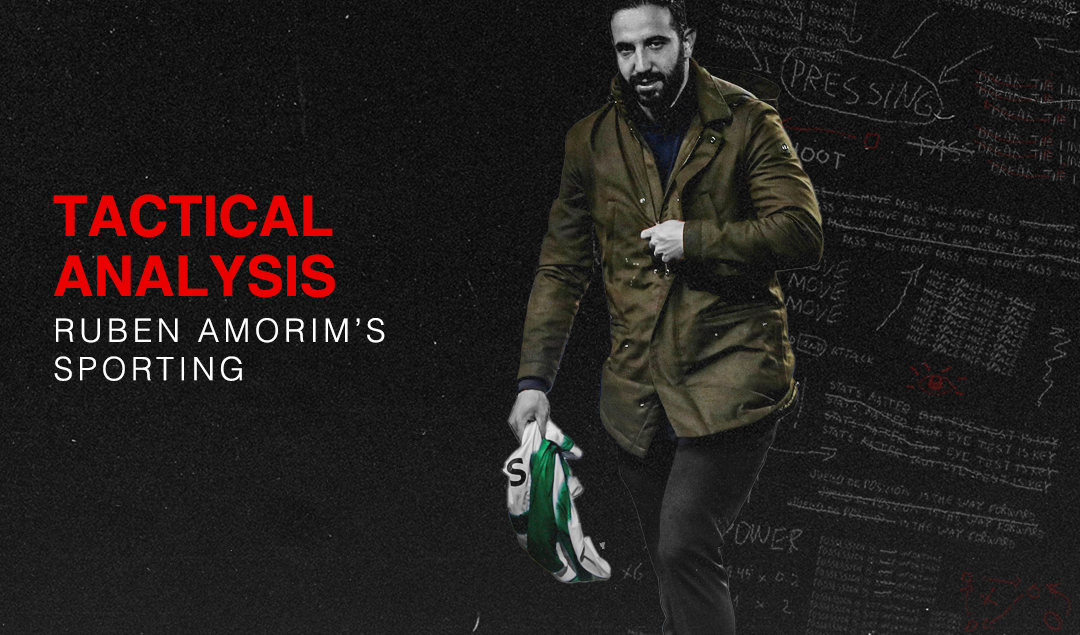Tactical Analysis: Rúben Amorim’s Sporting
It has been 19 years since Sporting were crowned champions of Portuguese football. That 2001-02 team, led by a 42-goal season from Mário Jardel and managed by László Bölöni, are now a mere relic of history, as Benfica and Porto have gone on to dominate the Primeira for the next two decades. However, that may be set to change. With nine league matches to go, Sporting currently sit first with an 8-point gap over Porto.
The roots of this incredible, undefeated league season can be found in an ex-Benfica player: Rúben Amorim. After more than a year of activity, Amorim hung up his boots at 32 years of age and began to pursue a coaching license with the Lisbon Football Association and study psychology. From then, he began managing third-tier side Casa Pia, but his time in charge ended bitterly as the team was docked six points due to Amorim giving in-match instructions without having the required level to do so.
Amorim received a one-year suspension from football, and while the bans were revoked, Amorim resigned from his post on January 22, 2019. Never to mind; Casa Pia would go on to seal promotion to Liga Portugal 2 at the end of the campaign. Amorim, on the other hand, initially agreed to return to Benfica, the club he had played at for over a decade, and looked set to coach their under-23 side, but ended up rejecting the move after a meeting at the club.
He returned to the third tier and took charge of Braga’s reserves, but when Ricardo Sá Pinto as dismissed from his duties on December 23, 2019, Braga president António Salvador decided to appoint Amorim to the first-team position.
The Minhotos had fallen to eighth place at the time of his sacking, but they started the Amorim era on the right foot with a 7-1 thrashing of Belensenses SAD at Jamor. Wins against Tondela, Porto and Sporting followed, culminating in a last-minute victory over Porto in the Taça da Liga Final following Ricardo Horta’s last-minute goal.
SC Braga – Building for a Title Challenge and a Brighter Future
Their impressive form continued under Amorim; after narrowly defeating Moreirense, Braga beat Sporting via a late goal from Francisco Trincão, and while they threw away a two-goal lead to draw at home to Gil Vicente following Bruno Viana’s red card, they bounced back with victories against Benfica, Vitória de Setúbal, and Marítimo. The only defeats that Braga would suffer under Amorim would come against Steven Gerrard’s Rangers.
Such impressive form drew the attention of Sporting, who, since Jorge Jesus’ departure in the summer of 2018, had gone through five managers: José Peseiro, Tiago Fernandes (interim), Marcel Keizer, Leonel Pontes (interim), and Silas. Desperate for a manager to turn around their form and form a new identity in the wake of Bruno Fernandes’ exit, they decided to pay €10 million for his services, the third-highest transfer fee for a manager in history behind André Villas-Boas and Brendan Rodgers. That figure has now ballooned to €14.4 million due to VAT and other fines.
It was a risky and expensive move from Sporting president Frederico Varandas, who had drawn the ire of fans since his electoral victory on September 8, 2018, and who risked sinking his popularity even further after paying an extraordinary amount for an inexperienced manager with a history of playing for their archrivals. Nevertheless, Varandas saw the value in Amorim’s training methods, his teams’ performances, and his usage of young players.
Amorim would manage just one match, a 2-0 victory over soon-to-be-relegated Aves, before the suspension of football due to the pandemic, but upon the return of Liga NOS, he began to institute a clear-cut, 3-4-3 system with a wide range of young, homegrown talents involved in the set-up such as Nuno Mendes and Eduardo Quaresma. The first match back from the break saw Sporting draw 2-2 to Vitória de Guimarães, followed by victories over Paços de Ferreira, Tondela, Belensenses SAD and Gil Vicente.
However, Sporting would end up drawing 0-0 to Moreirense at the Parque Joaquim de Almeida Freitas despite the hosts playing a man down for forty minutes following Rafik Halliche’s expulsion, and while they did manage to narrowly defeat Santa Clara via a late winner from Jovane Cabral, they would go on to lose to Porto and Benfica and draw to Vitória de Setúbal. It meant that Braga sealed third place on the final matchday of the season, whilst Sporting finished a meager fourth in the league.
Squad Analysis
The shortened summer break saw plenty of upheaval in the squad; defensive leader Jérémy Mathieu retired from football after suffering a knee injury in training, whilst Rodrigo Battaglia, Miguel Luís, Luciano Vietto, Wendel, Marcos Acuña, and many more departed the Estádio José Alvalade. To replace Mathieu, Sporting brought in Moroccan international Zouhair Feddal on a two-year deal, whilst Antonio Adán joined on a free transfer to reunite with his ex-Real Betis teammate.
Boavista and Os Belenenses: The Glorious Exceptions to Portuguese Football’s Oldest Rule
Nuno Santos, who had spent the majority of his career at Porto and Benfica, joined on a five-year deal for €4 million in addition to shares in the economic rights of Gelson Dala (50%) and Francisco Geraldes (75%) who headed the other way to Rio Ave. Brazilian youngsters Matheus Reis and Bruno Tabata joined as rotational pieces, whilst Vitorino Antunes returned to Portugal after seven years abroad, joining on a free transfer as well.
Apart from Adán, who has showcased his fine shot-stopping abilities after spending the past two years as Jan Oblak’s backup at Atlético Madrid, and Feddal, who has impressed on the left side of Sporting’s back three, one of Sporting’s shrewdest purchases was Pedro Porro. In his second loan spell after joining Manchester City in 2019 for £11 million, Porro has locked down a starting spot as Sporting’s right wing-back, earning a maiden call-up to Luis Enrique’s Spain squad last month.
Despite all the transfer sagas and constant rumors, few Sporting fans could have foreseen a midfield double pivot of João Palhinha and João Mário under Amorim this season. The latter returned to Sporting four years after earning a €40 million move to Inter on the back of a successful European Championship with Portugal, whilst Palhinha had looked set to depart Lisbon after spending the past four years on loan, but after a proposed €15 million move to Wolves broke down, he ended up remaining and reuniting with his former manager Amorim.
Nevertheless, the crown jewel of Sporting’s summer recruitment has without a doubt been Pedro Gonçalves. After an impressive season at Famalicão, Pote joined the Lions on a five-year deal and has unleashed his potential with 15 goals and 5 assists in 28 appearances, attracting interest from Manchester United and Arsenal and earning a maiden call-up to the Portugal Under-21 team. He started every single game for the Esperanças as Rui Jorge’s side maintained a perfect record in the group stage, scoring six goals and conceding zero, and booking a date with Italy in May’s quarterfinal.
Amorim has wisely ushered in a crop of veteran leaders such as Adán (33), Luís Neto (32), João Mário (28), Feddal (32) and Sebastián Coates (30) to provide calm and experience in the dressing room and help back his message. João Pereira, who is a year older than Amorim and played alongside him for Portugal, joined on a short-term deal from Trabzonspor and will likely incorporate himself into the coaching staff at the conclusion of the season.
On the other end of the spectrum, there is a steady feed of promising young talents who have taken the leap from Sporting’s Alcochete academy to the first team. Tiago Tomás (18) has played a vital role in attack for the Lions this season, whilst Daniel Bragança (21) is finally breaking through at the first team level after a loan spell at Estoril. The likes of Jovane Cabral (22), Luís Maximiano (22) and Eduardo Quaresma (19) haven’t enjoyed as many opportunities as last season but are still considered valuable assets in the long term.
Gonçalo Inácio has locked down a starting spot on the right side of the back three, and the 19-year-old’s rock-solid performance has seen Sporting concede just 12 goals in 25 league matches this season and maintain an undefeated record in the Primeira (20 wins and 5 draws). Nuno Mendes, on the other hand, has been a revelation at left wingback, and his form looks increasingly likely to earn the 18-year-old an inclusion in Fernando Santos’ Portugal squad in addition to a big-money transfer this summer.
Data Analysis
In his first full season as a manager at the top level, Amorim has found the right balance at Sporting and engineered a system that gets the most out of his key players. Sporting have scored 47 times this season, slightly fewer than Porto’s 53, and a testament to their efficient finishing in front of goal, having converted well above their xG of 36. They’re overperforming their xG on both sides of the pitch, having conceded 12 goals from 16.5 xGA, making them the best defense from Europe’s top six leagues — only Lille, Benfica and Atlético Madrid have conceded fewer than 20.
It is true that Sporting’s relatively comfortable schedule has benefitted them in comparison to their domestic rivals. Whilst Benfica, Braga and Porto’s squads continued to be stretched with European competition throughout March (and April in Porto’s case), Sporting were eliminated from the UEFA Europa League play-offs on October 1 in a 1-4 home defeat to LASK Linz.
As such, perhaps it is little surprise that Sporting have a +35 goal difference when they should only have a 20+ difference based on xG figures, whilst Porto (+29), Benfica (+26) and Braga (+20) have registered inferior numbers due in part to having to play twice a week for months on end. By differentiating the Goal Difference of the Primeira’s 18 teams from their Expected Goal difference, we can take a look at how Sporting rise above their rivals in terms of overperforming xG.
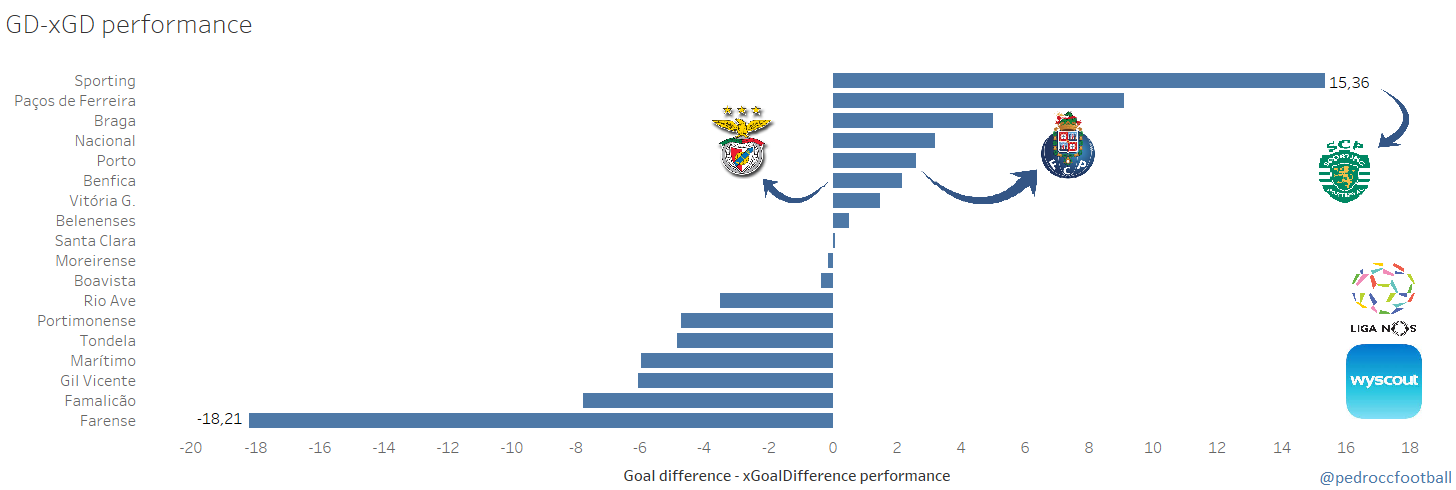
Photo: Wyscout
A large part of this overperformance is down to Pote, who is overperforming his individual xG by a little over 9 (15 goals from 5.93 xG), but while he is certainly skewing the mean, Sporting’s impressive numbers are spread across different players and different sectors of the pitch. If we look at their off-the-ball metrics and analyze their pressing intensity, we see how Sporting are only allowing 7.66 passes per defensive action (PPDA), putting them narrowly behind Porto and Benfica.
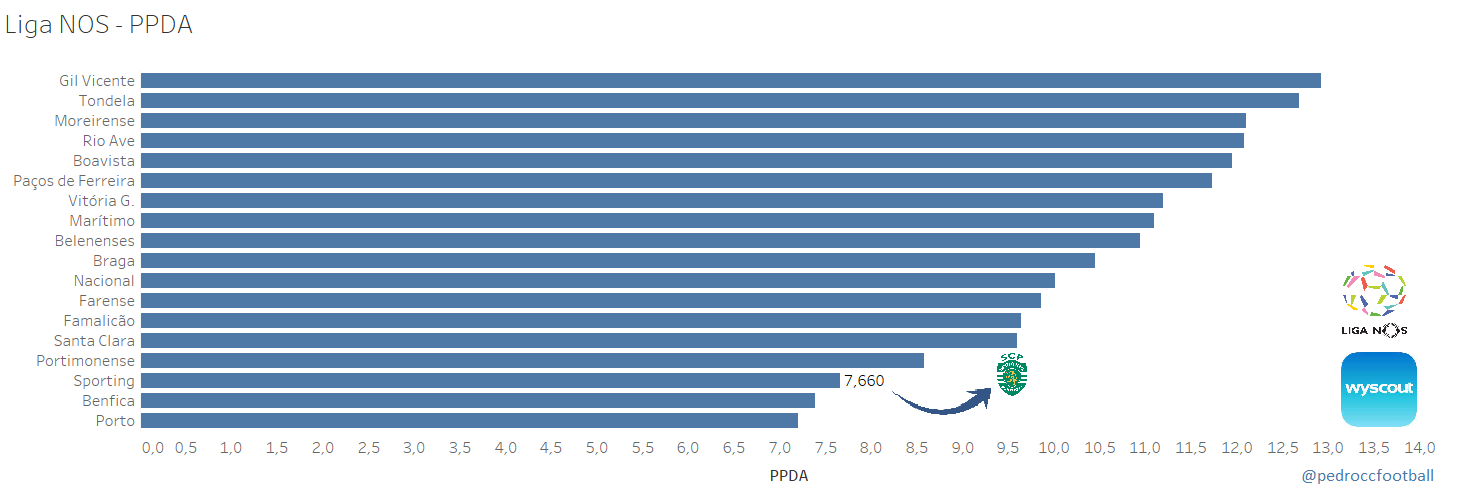 Photo: Wyscout
Photo: Wyscout
Shifting to the defense, Sporting have conceded just 166 shots so far, which translates to 1.85 shots conceded per match, well above their closest rivals Porto. Little surprise, then, that Sporting have conceded just 12 goals across 25 league matches this season and are putting up underlying numbers that rival Europe’s finest.

Photo: Wyscout
Moving on to possession-based metrics and other attacking statistics, Sporting sit third in terms of average possession (58.4%) behind Porto (60.1%) and Benfica (63.7%). Their numbers worsened in terms of passes per (opposition) defensive action with 10.59, behind Santa Clara, Porto, Portimonense, Famalicão, Braga and Benfica, who ranked first with 16.89.
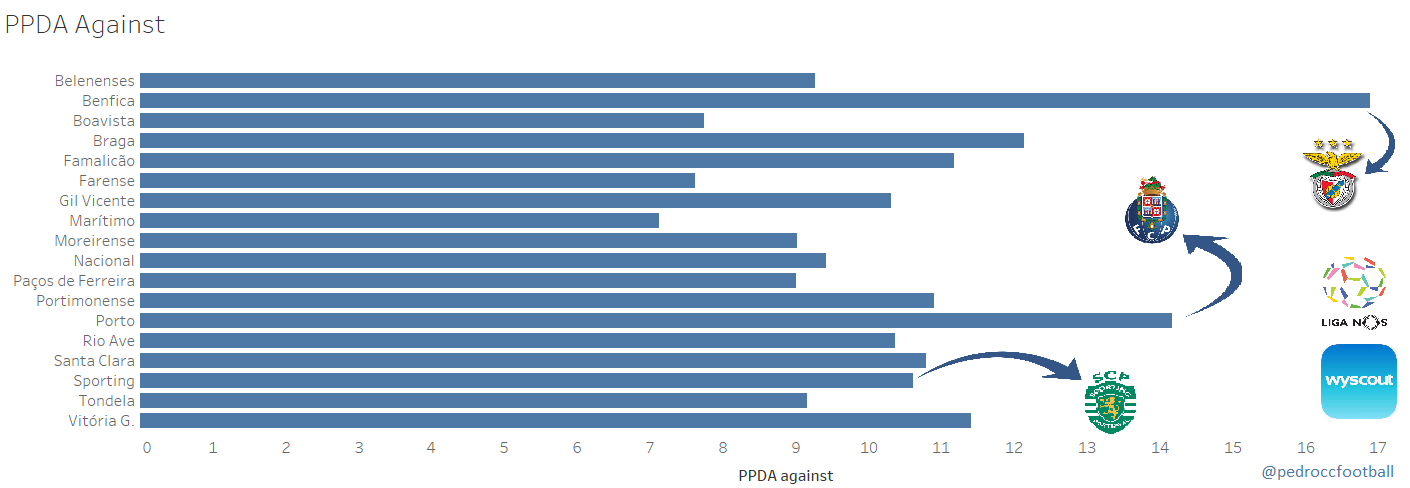
Photo: Wyscout
Data by itself without context does’t mean much because generally a team who has more time the ball will top the majority of possession-based and attacking metrics, and forwards who play for these teams, generally, also sit on the top of most attacking metrics. So, with that being said, let’s try to give data some meaning.
Sporting have completed 10,876 passes throughout their matches, 1,332 of those coming to the final third. This means Sporting players complete a pass to the final third every 8.2 passes, a number that doesn’t quite put them in high esteem in this metric. Whilst they do rely on their best dribblers such as Nuno Mendes and Pote to carry the ball into the final third, it is clear that they could and should improve in this aspect.
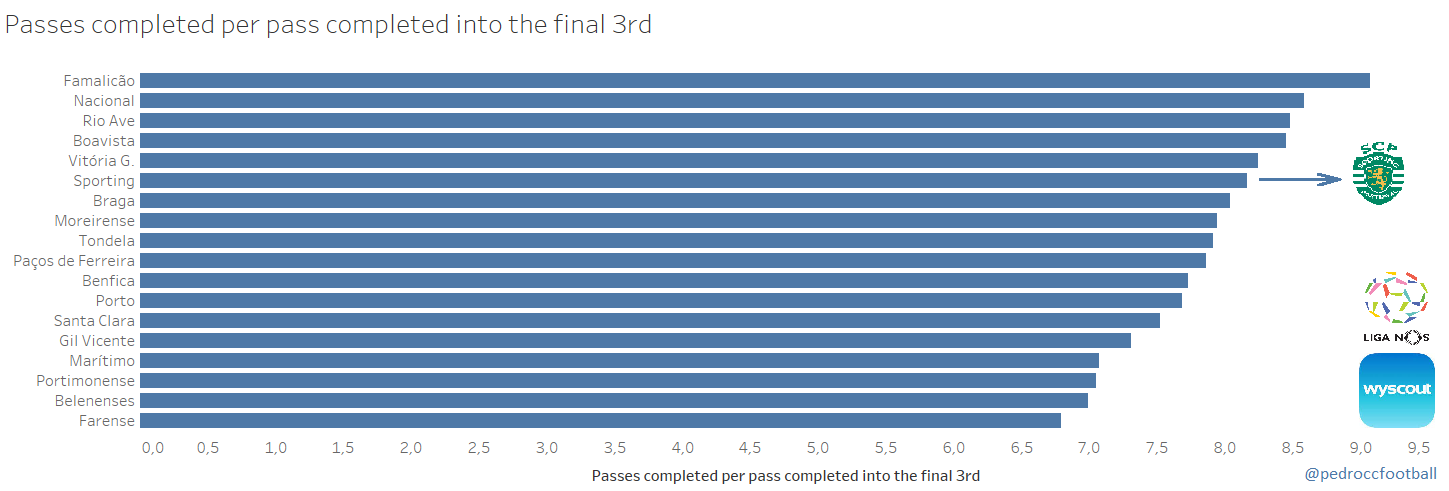
Photo: Wyscout
In Liga NOS, the amount of time the ball is in play during each match is 49 minutes. Sporting are currently averaging 58.4% possession per match in the league, and by doing the math, Sporting have the ball for 28.6 minutes per match. We can use this statistic in a lot of different ways: to calculate how many shots or xG Sporting accumulate per 5-10 minutes, or how many times they enter the box every 3-5 minutes, or how long it takes them to enter the penalty area.
Wyscout states that Sporting have accumulated 390 touches in the box this season which translates to 16.25 touches in the box on average per match. If we divided Sporting’s 28.6 minutes of possession with the 16.25 touches in the box, we see that Sporting reach the penalty area every 1.76 minutes (105 seconds).
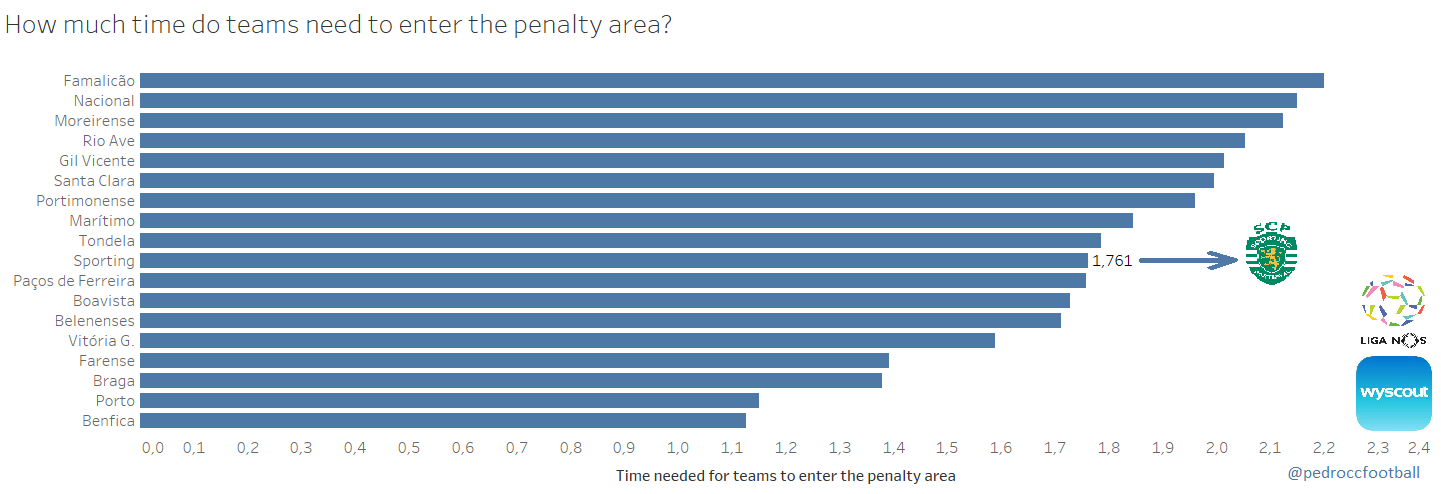
Photo: Wyscout
Although Sporting don’t particularly rank well in this metric, they’re the most efficient team in the league, needing only 3.4 touches in the box to complete a shot. However, this metric also isn’t completely precise given that the shots metric counts every shot, instead of just shots inside the box. Nevertheless, we can still attain a decent idea of Sporting’s efficiency in the final third.
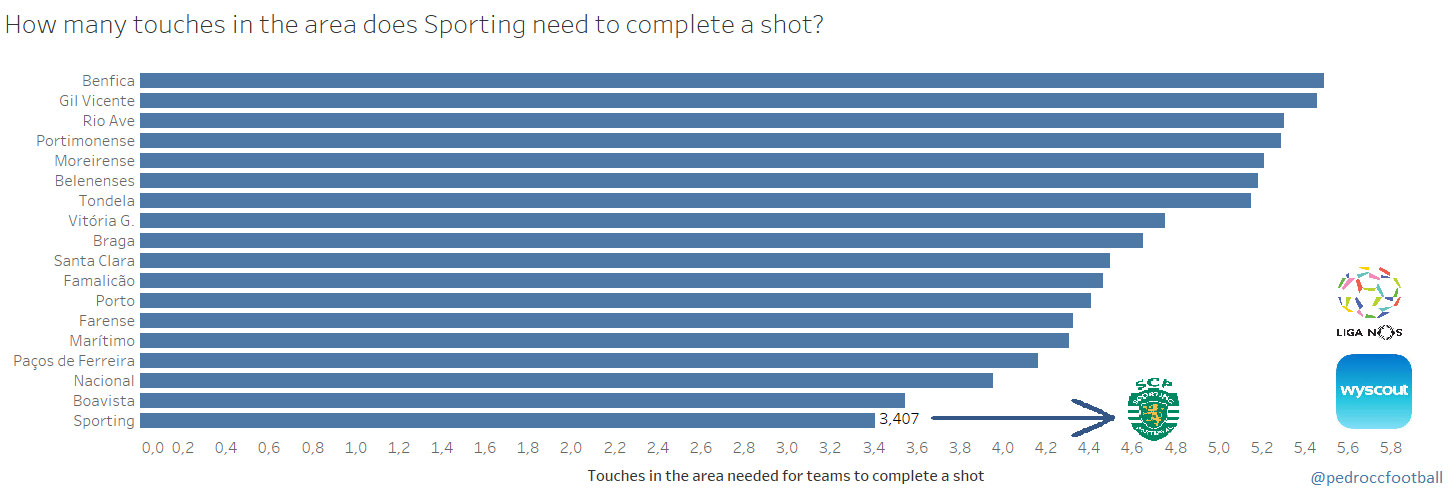
Photo: Wyscout
Formation + Patterns
Since being appointed as manager last March, Amorim has typically utilized a 3-4-3 formation, with Adán playing between the sticks, and Inácio, Coates and Feddal patrolling the defense. Their Uruguayan captain has been a force of nature on both ends of the pitch, impressing in the center of the back three whilst also registering 6 goals this season, including last-minute winners against Gil Vicente and Santa Clara over the past two months.
João Mário and Palhinha are responsible for patrolling the midfield, protecting the defense, and allowing the wing-backs (Pedro Porro and Nuno Mendes) to go forward and combine with the attackers (typically Pote, Tiago Tomás, and Nuno Santos). Mendes has earned himself a maiden call-up to Portugal’s national team with his impressive form, starting against Azerbaijan and Luxembourg in last month’s World Cup Qualifiers, whilst Palhinha earned a maiden call-up as well and even scored after coming off the bench against Luxembourg.
Whilst Mendes will be aiming to push Raphaël Guerreiro for a starting spot, Palhinha will likely play a secondary role to the likes of Danilo Pereira and Rúben Neves this summer. Nevertheless, that should not take away from the 25-year-old midfielder’s value. Perhaps only Coates and Pote can match his importance in Sporting’s success both on and off the ball; his loan return and failed move abroad has been nothing short of a blessing in disguise.
After spending the past two years on loan at Braga (where he was briefly coached by Amorim), Palhinha has provided what Matheus Nunes, Wendel and co. were unable to offer last season: aggression and physicality in both ground/aerial duels, an impressive positional awareness, and a decent but not extraordinary ability in possession. We can get an example of Palhinha’s importance in the general set-up in the below example from Sporting’s 2-0 victory over Paços de Ferreira on February 15.
Amorim himself has stated that he didn’t want to overcomplicate things by showering his players with heavy tactical instructions, but there are certain automatized movements that he has imbued into the squad, as seen above. One of the trademark movements that Amorim has brought into the side is for the players to clog the middle and force the opposition into making risky passes towards the flanks. Notice Palhinha’s positional awareness to help prevent the forward passing option.
Whilst Sporting have been one of the most defensively solid teams in Europe this season, they are prone to conceding dangerous opportunities when the opposing team overloads the midfield and outnumbers Palhinha and Mário, and as a result, creates danger between Sporting’s lines. This is where Sporting’s center backs need to be focused and ready to deal with any attacking threat that comes their way.
When defending in a retreated shape or a low block, Sporting’s players stay just behind the line of the box in order to keep a compact shape, prevent any potential shots from the edge of the box, and limit attacking opportunities. This is far easier than defending at different heights of the box and staying coordinated against an opposition attack. We can get a glimpse of this in the above examples against Benfica, Paços de Ferreira and Vitória de Guimarães.
One of Sporting’s toughest tests in the league came on February 27, when they faced off against Porto at the Estádio do Dragão. Porto had a larger amount of opportunities (14 shots/3 shots on target) compared to Sporting (4 shots/0 shots on target) as well as possession (56% vs. 44%), but they came away with a stalemate thanks to a valiant defensive display not only from the defenders, but João Mário and João Palhinha in midfield.
Sérgio Conceição’s team played a narrow 4-4-2 with Jesús Corona and Otávio as inside midfielders with Zaidu Sanusi and Wilson Manafá, the fullbacks, pushing high up the pitch to offer width, andallowing their teammates to play inside. When Porto could pass Sporting first pressing line, Otávio and Corona, alongside Matheus Uribe and Sérgio Oliveira, the two midfielders, outnumbered Sporting midfield and were able to create some danger and decent opportunities to score.
In the above example, Otávio wriggles away from Pote and drives inside whilst Oliveira backs up to offer a short passing option. The Brazilian quickly finds Uribe, forcing Mário to press the Colombian midfielder instead of him, before receiving unmarked between the lines in ample space. He chips the ball over the defense, but Moussa Marega is unable to make Sporting pay with a dangerous shot.
Whether chasing down a long ball or remaining stable against a counter-attack, Sporting have enjoyed the fruits of their well-coordinated defense that has seen them take the Portuguese title race by the scruff of its neck. I manually tracked each of the 12 goals that Sporting have conceded in league play this season, and found that only three of those goals came from opposition counter-attacks or transitions. When Sporting lose the ball, they are generally well-positioned to deal with the danger and decrease the threat of the opposition’s counter.
We can see in the below examples against Porto and Paços de Ferreira how Sporting’s compact off-the-ball shape forces the opposition defenders into circling the ball into wide areas, blocking off central progression routes and creating turnovers in dangerous areas. They are simple but effective when pressing, as their medium block allows them to shut down space between the lines and recover the ball and instigate quick, direct counter-attacks.
As previously mentioned, Sporting are one of the most aggressive pressing sides in Portugal, sitting third in the league in PPDA allowed. Amorim’s team utilizes an intense pressing style and attempts to win the ball back in the final third — even when the game is even or they are in a losing position. I manually tracked each of Sporting’s 47 goals that they scored in the league this season and concluded that they have scored eight goals after recovering the ball in the opposition’s half (17.4%).
While they sit in the league’s bottom half in certain possession-based metrics, when they do manage to put the ball into the final third, they are the most efficient team in the Primeira. I manually tracked each of Sporting’s goals and concluded that they have scored just 11 times from long possession plays (24% of their entire league goals) which isn’t exactly the most encouraging statistic for a team that registers 58.4% possession per game.
Amorim has reached an incredible level of success with his 3-4-3 formation, as it is a simple formation that allows for a quick adaptation process for young players, but it lacks the positional rotations that can create dynamic attacking opportunities. Due to this lack of rotations, Sporting have become rather predictable and have not scored much from lengthy spells of possession. It is also abundantly clear that when in possession, the players are less willing to take risks in their movement as they want to be well-positioned to react to a turnover.
This was confirmed by Conceição, who stated before the draw on February 27, “Sporting is a very pragmatic team that knows what it wants. They are a team that defends with a lot of people, because the squad is aware that it is necessary to defend itself to win games. Sometimes simplicity is the most difficult to counter. One looks at the Sporting team and realizes that it is easy to dismount, to understand how they play, but if we are not competent..”
Sporting operate in a 3-4-3 and utilize several different methods to evade the press and create attacking opportunities. We see an example of their normal build-up routine against Paços de Ferreira in the above video, with João Palhinha and João Mário positioned on different heights and the center backs and wing-backs attempting to stretch apart the opposition with horizontal passing.
On the other hand, in the below examples against Paços de Ferreira and Marítimo, Sporting use interchanging movements to distract the opposing defenders and create space for the attackers to exploit. They focus on exploiting the wings and half-spaces; Pote usually plays inside with Nuno Santos sticking to the left byline, and Tiago Tomás can utilize his speed and combative nature to prey upon the opposing backline. Pedro Porro and Nuno Mendes also provide a dangerous attacking threat from the wing-back positions.
Sporting’s 3-4-3 has seen them achieve stable results, but it has become somewhat predictable and allowed their performances to worsen, although they have been able to grind out three points on most occasions. After drawing to Porto, they needed a stoppage-time goal from Coates to beat Santa Clara, and they only narrowly defeated Tondela at the Estádio João Cardoso via a late goal from Tiago Tomás.
Sporting’s New-Look 3-4-3 Midfield Diamond
Taking notice of his team’s increasingly predictable set-up, Amorim elected to try a new formation against Vitória de Guimarães. Coates missed the game after receiving a booking against Tondela, and as a result, Luís Neto came into the team with Gonçalo Inácio being shifted from the right side of the back three to the center of defense. Nuno Santos also missed out after being involved in a car accident, prompting Amorim to play Daniel Bragança in his place.
Bragança, unlike Santos, is a central midfielder rather than a winger; instead of going with the flat 3-4-3 that Sporting have grown accustomed to this season, Amorim opted for the 3-4-3 diamond formation that was popularized by Johan Cruyff during his time in charge of Barcelona’s Dream Team. Bragança was charged with playing as an advanced midfielder, providing an extra body in the center, and linking up with Pote and Tiago Tomás in attack.
Despite missing two starters in Santos and Coates, Amorim’s side played with greater fluidity and created a plethora of chances to take a 1-0 victory via Gonçalo Inácio’s opening goal, a margin that flattered Vitória rather than Sporting. Amorim maintained the new formation in the first match after the international break, with the Uruguayan captain coming back into the defense and Paulinho getting the start in attack over Tiago Tomás.
Paulinho gave Sporting an early lead and nearly added another goal before the break, but it was ruled out after Pote was adjudged to have been an inch offside. Moreirense valiantly defended against a flurry of opposition attacks, keeping the margin at just one goal, and in the 90th minute, they found an equalizer as Walterson delicately curled a shot past Adán and into the bottom left corner.
This is Sporting’s Achilles heel: their inability to control the match when leading. Amorim’s de-facto motto is “Attacking is the best form of defense,” but sometimes, controlling the flow of possession is the best form of protecting a lead, and Sporting have lacked the capacity to maintain and recycle possession when in winning positions. Part of this is mental: Sporting are edging closer to their first title in two decades and this puts a mountain of pressure on the players’ brains.
Furthermore, Sporting’s starting line-up is composed of several youngsters such as Gonçalo Inácio (19), Pedro Porro (21), Nuno Mendes (18), Pedro Gonçalves (22) and Tiago Tomás (18), and this lack of experience can cause them to make rash decisions that lead to turnovers. However, it should be noted that Amorim has instilled a fierce and hard-working mentality in his players, who seem unified and braced for the task at hand: ending their 19-year title drought.
Whether using the knowledge that he picked up in his playing days or the knowledge he learned during his psychology classes, credit has to be given to Amorim for getting the best out of his team and keeping their egos grounded as they enter the home stretch of the season. He has rewarded several young prospects with their professional debuts, including Inácio, Mendes, Joelson Fernandes, and Dário Essugo, who came off the bench against Vitória just days after turning 16 years old.
Conclusion
At 36 years of age, Rúben Amorim is on the verge of doing what countless managers have failed to do before him: bring a league title back to the Estadio José Alvalade. Whilst his team has become somewhat predictable over the past few weeks, his newfound diamond formation and the return of Paulinho to full fitness give him a joker up his sleeve. The Portuguese striker joined in the January window for €16 million, with Cristian Borja (free transfer) and Andraž Šporar (loan) heading the other way to Braga.
Paulinho had previously played under Amorim at Braga, racking up 25 goals and 9 assists in 48 appearances during the 2019/20 season, and his emergence should give Sporting a new dimension in attack. “I think he had a good performance, he is a more mature player, better physically and has an enormous capacity to add value to the team. He will grow, as will the team, which has evolved a lot, in my opinion,” stated Amorim after the 1-1 draw to Moreirense.
Nine league matches remain in the Primeira campaign, with Sporting maintaining an 8-point lead over Porto with 65 points from 25 matches. Apart from an away fixture at Braga on April 25, they will face bottom-half sides Famalicão, Farense, Belenenses SAD, Nacional, Rio Ave and Boavista over the next month, and they could officially claim the title before the Derby de Lisboa on the penultimate matchday of the season.
Eager to keep a tight hold on their wunderkind coach, Sporting recently renewed Amorim’s contract to the end of the 2023/24 season with a release clause of €30 million. He has already filled his managerial trophy cabinet with back-to-back Taça da Liga triumphs for Braga and Sporting, but now, it’s time for him to make history by bringing the glory days back to the green-and-white side of the Portuguese capital.
By: Pedro Carvalho
Featured Image: @GabFoligno / Carlos Costa – AFP
